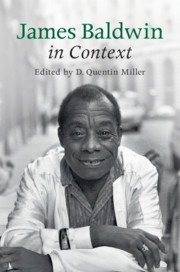Book contents
- James Baldwin in Context
- James Baldwin in Context
- Copyright page
- Contents
- Contributors
- Introduction: James Baldwin in Context
- Part 1 Life and Afterlife
- Part 2 Social and Cultural Contexts
- Part 3 Literary Contexts
- Chapter 19 The Protest Essay Tradition
- Chapter 20 Baldwin and the Black Arts Movement
- Chapter 21 Baldwin and the Rhetoric of Confession
- Chapter 22 The Poetics of Beautiful Blackness On Baldwin and Négritude
- Chapter 23 Mid-Century Theater
- Chapter 24 Sex and the Twentieth-Century Novel
- Chapter 25 Responding to Richard Wright
- Chapter 26 Baldwin’s Literary Friendships
- Chapter 27 Reviewers, Critics, and Cranks
- Chapter 28 Baldwin’s Collaborative Dance
- Chapter 29 Baldwin’s Literary Progeny
- Index
Chapter 23 - Mid-Century Theater
from Part 3 - Literary Contexts
Published online by Cambridge University Press: 12 July 2019
- James Baldwin in Context
- James Baldwin in Context
- Copyright page
- Contents
- Contributors
- Introduction: James Baldwin in Context
- Part 1 Life and Afterlife
- Part 2 Social and Cultural Contexts
- Part 3 Literary Contexts
- Chapter 19 The Protest Essay Tradition
- Chapter 20 Baldwin and the Black Arts Movement
- Chapter 21 Baldwin and the Rhetoric of Confession
- Chapter 22 The Poetics of Beautiful Blackness On Baldwin and Négritude
- Chapter 23 Mid-Century Theater
- Chapter 24 Sex and the Twentieth-Century Novel
- Chapter 25 Responding to Richard Wright
- Chapter 26 Baldwin’s Literary Friendships
- Chapter 27 Reviewers, Critics, and Cranks
- Chapter 28 Baldwin’s Collaborative Dance
- Chapter 29 Baldwin’s Literary Progeny
- Index
Summary
In the final pages of David Leeming’s magisterial biography James Baldwin, the author recounts an intimate confession that Baldwin made to him in their final conversation, which took place on November 24, 1987, just seven days before Baldwin’s death: “That night Jimmy and I talked about theater. If he could have started all over again, he might have concentrated on being a playwright and maybe an actor; he liked the immediacy of the stage, working with live people and having the audience right there.” What might happen to our understanding of Baldwin’s life and legacy if we linger with this minor detail? I suggest that the implications of this short, often overlooked passage when situated in the context of the other biographical details of the last year of Baldwin’s life – namely the fact that he was at work on what was to be the loosely autobiographical play The Welcome Table – are significant. Baldwin’s deathbed longing to start life “all over again” with a focus on playwriting and performance might come to some as a stunning admission. But for those attuned to the minor frequencies of the author’s life, Baldwin’s confession simply gives voice to a desire (specifically the desire/impulse toward theater and theatricality) that seems to have been with him – even if never fully realized – all throughout his life. Baldwin’s journey as a playwright was a lifelong expedition that began in his earliest moments as a fledgling writer. As early as 1941 – a full decade before the publication of his novelistic debut Go Tell It on the Mountain (1953) – Baldwin had already penned a drama entitled These Two, a short play about two young black men, one of whom commits suicide and one of whom is killed by the police. His career as a published playwright also included his 1958 stage version of Giovanni’s Room, which ran at The Actors Studio in Greenwich Village under the direction of Turkish director Elia Kazan (where he met actor Engin Cezzar, who would later become the driving force behind Baldwin’s decade in Istanbul, Turkey); his 1964 Blues for Mister Charlie (which he famously dedicated to the memories of Medgar Evers and Emmett Till); and 1954’s The Amen Corner (which he had workshopped for well over a decade – including an early run at Howard University in 1955 – before eventually making its doomed arrival on the Broadway stage, where it closed after only eighty-four performances).
- Type
- Chapter
- Information
- James Baldwin in Context , pp. 244 - 253Publisher: Cambridge University PressPrint publication year: 2019



